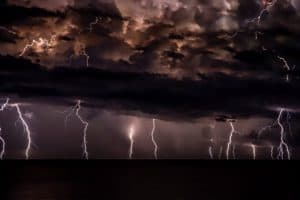
It is difficult to predict the extent of damage a storm will cause. A sudden spike in the electric current flowing through a house may lead to burnt-out electronics or sparks which can cause electrocution.
What are the potential issues that can accompany a storm surge?
Power Outages
A power outage is the loss of electrical power for a certain period. Thunderstorms are the most common causes of power outages. A storm might cause a power surge and this might lead to tripping the circuit breakers. The power loss might be temporary in some cases and it is best to wait out the storm before attempting to fix the tripped circuit.
Property destruction.
It is not strange to find a room full of blown circuits after a storm. The chances of this happening are pretty high in homes that are not properly insulated. Electrical discharge in the form of lightning can still find its way into homes and cause damage to electrical appliances. In situations such as these, a lot of electrical components gets destroyed by the sudden flow of electrical energy through them. To prevent property loss due to energy spikes, it is always best to turn appliances off during a storm or when not in use at all.
Water flooding.
There are instances where the storm is so heavy that the house is flooded. A flooded home is a dangerous electrical hazard. Water gets into electronic equipment and renders them practically useless after soaking their components. The insulation of the house can also be affected which increases the risk of electrocution as water is a good conductor of electricity.
What to do to prevent these issues?
In case of storms here are a few things you can do to safeguard your home:
- Install surge protectors. Surge protectors work by blocking or shorting to ground voltages above the safe threshold. To minimize damage to electrical pathways, it is best to use box-mounted surge suppressors. They are worth every penny as they help safeguard wiring and devices during a storm.
- After every storm, inspect plugs for signs of burns. If the metal is melted or there are dark spots on the plug, consider replacing the plug.
- Use an affordable outlet checker to check the conditions of sockets all over the house. A damaged socket may have an open circuit, short circuits, burns, and more.
- Check the circuit breaker in the home, check for signs of burns or arcing. If there is a tripped circuit breaker, flip it on and off three times to reset the circuit. If it does not stay in the ‘ON’ position, consider contacting an expert.
- In case of damaged appliances, contact a professional repair company for help.

